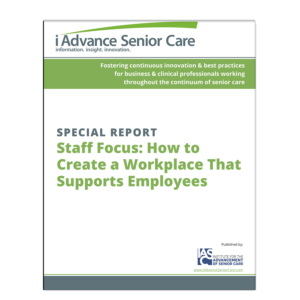Are DONs an Endangered Species?
| Are DONs an endangered species? Interview with V. Tellis-Nayak, PhD |
| They like their jobs, but wouldn’t recommend them to anyone and plan to leave their positions within a few years. They want to be nurses, but find instead that they must be human resources leaders, risk-management experts, and masters of regulatory paperwork. They value their relationships with staff, administrators, and residents but, as they acquire more professional education, are less likely to stay around long enough to enjoy them. This, in very broad strokes, is the picture of current directors of nursing (DONs) that emerges from a hard-hitting study published recently in Health Progress, the journal of the Catholic Health Association of the United States. Long-term care researcher V. Tellis-Nayak, PhD, in conjunction with the firm My InnerView, surveyed 103 DONs in Virginia nursing homes on all the elements underlying their satisfaction and dissatisfaction with their roles. Replete with pithy verbatim quotes (“We have lost sight of what is good and what is foolish, what is quality of care, and what is not”), the survey served up such data as: Nearly two out of three DONs agree or strongly agree that they are frustrated in their jobs; while 84% are satisfied being DONs, and 70% would choose to be DONs again, only 52% would recommend it to others. Dr. Tellis-Nayak concludes that DON turnover rates exceeding 50% of late should not be surprising. Recently, Dr. Tellis-Nayak offered his observations on the study’s findings and today’s DON in an interview with Nursing Homes/Long Term Care Management Editor-in-Chief Richard L. Peck. Peck: The impression emerges from your findings that DONs are more comfortable functioning as clinicians than as managers. Would you elaborate on that? Dr. Tellis-Nayak: Basically, the DONs we surveyed want to be nursing leaders and mentors and build strong relationships with residents and staff. Unfortunately, responsibilities have been added to their role that have taken them further and further away from what they perceive as their primary vocation. They’re involved in the complexities of human relations management, in wrestling with staffing problems, in having to be on call to make up for staffing shortfalls. They have not been trained to meet these administrative challenges. Nor are they trained for budgeting, for liability risk management, or for the paperwork of regulatory compliance. In general, no one has set the basic requirements of the DON position; there is no specific curriculum for this, and hardly any state or professional association demands that DONs receive continuing education. The resulting frustration level among DONs is very, very high. Peck: Why do these nurses become DONs in the first place? Dr. Tellis-Nayak: There is a tremendous turnover problem-near 50% generally, and more than 100% in one state, along with a persistent 5% vacancy rate. So owners and administrators, seeing that they have very good nurses on their staffs, ask them to become DONs, but offer them no managerial training or specific guidance for doing the job. Continuing education is apparently not a very high priority in this area. Among these Virginia-based respondents, more than half had not attended a professional conference in at least two years; they’re not required to do so by their states or professions, and working, as many do, a 60-hour week, they’re too overburdened to attend conferences anyway. Peck: Respondents seemed to value their working relationships with administrators very highly. Would you comment on that? Dr. Tellis-Nayak: As caregivers, they value relationships in general. They rank their relationships with residents and staff very highly, as well. Their greatest satisfaction comes from making a difference in people’s lives; this is the primary motivation that sustains them in their DON roles. The relationship problems that seem to generate the most frustration involve regional managers who are based off-site. The DONs note that building relations is a problem here and, in some cases, the DONs resent their regional managers almost as much as they do state surveyors. Peck: Regarding that latter point, they didn’t seem to view regulation, per se, as a relatively major problem. Dr. Tellis-Nayak: Regulation itself is not a problem for them; many see the value, for example, of the reforms of OBRA ’87. What bothers them is the implementation of the regulations, the way they’re asked to account for every step in the process and then end up getting caught on their documentation. They’re unhappy with the way regulations are interpreted by surveyors. As many see it, two or three surveyors make a surprise visit, spend two or three days picking at their work, and give them deficiency citations, but offer no praise or credit for the good work they do. Many DONs will tell you that the day they really don’t feel like being a DON is the day the surveyors come in. “You’re making me into a paper-pushing bureaucrat,” they’ll say, “not a caregiver.” Peck: Were you surprised to find them rating “resident-centered care” to be their top training need? That would seem to be what they’re expert at. Dr. Tellis-Nayak: What you’re seeing here is frustration with being untrained for putting the necessary systems in place to ensure continuing quality improvement. As clinicians, they know how to deliver care personally, enjoy it, and perhaps do it better than anyone else on staff. But they feel less confident about organizing the delivery of quality care in a systematic way. Peck: What is the take-home message for the administrator from this study? Dr. Tellis-Nayak: It’s really a message to all top managers and owners: Make sure that you evaluate the role of your DON and try to figure out a way to outsource or offer support for some of the functions that are giving her (or him) trouble, such as staffing and liability risk management. Peck: And the message for society at large? Dr. Tellis-Nayak: States should work with the nursing profession to develop standards for the DON position. There are no such standards now, and the educational backgrounds of today’s DONs are widely varied. The paradox, of course, as we saw from this study, is that the more educated they are, the more likely they are to drop out of long-term care altogether. That is the tragedy of the DON position: The better educated ones and the younger ones needing more time to spend with families are leaving. About half of them say they will be gone in five years. That’s why it’s so important to professionalize the DON’s role and to minimize the activities that she (or he) sees as pulling her away from her primary purpose on the job. For further information, phone My InnerView at (715) 848-2713 or e-mail Dr. Tellis-Nayak at vtn1@aol.com. To send your comments to the editors, e-mail 2peck0406@nursinghomesmagazine.com. |
I Advance Senior Care is the industry-leading source for practical, in-depth, business-building, and resident care information for owners, executives, administrators, and directors of nursing at assisted living communities, skilled nursing facilities, post-acute facilities, and continuing care retirement communities. The I Advance Senior Care editorial team and industry experts provide market analysis, strategic direction, policy commentary, clinical best-practices, business management, and technology breakthroughs.
I Advance Senior Care is part of the Institute for the Advancement of Senior Care and published by Plain-English Health Care.
Related Articles
Topics: Articles , Staffing












